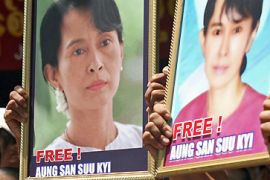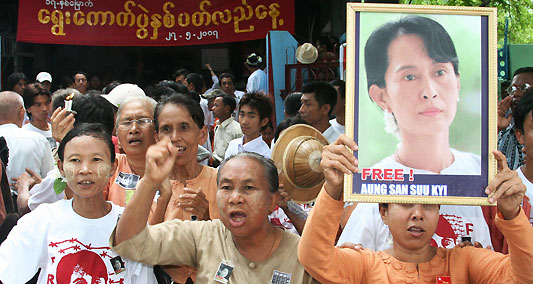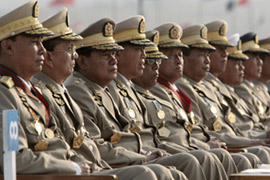Suu Kyi’s long silence
Protests in Myanmar as Aung San Suu Kyi’s house arrest is extended by another year.

 |
| Myanmar activists have risked arrest to call for Aung San Suu Kyi’s release [Reuters] |
The last time Aung San Suu Kyi was allowed to leave her family home on Yangon’s University Avenue was for an hour in November last year.
The brief interlude from her strict isolation was permitted so that she could meet the visiting United Nations’ special envoy to Myanmar, Ibrahim Gambari.
At the time her doctor had not been allowed to visit in several months and she asked for more regular check ups.
Aung San Suu Kyi has spent 11 out of the past 17 years either in prison or under house arrest.
Her current term, just extended by the government for another year, is the strictest form of detention so far.
Recently it was reported that two physicians had visited her twice in one week, raising new concerns about how her health is bearing up in isolation.
| Myanmar timeline |

1988: Military crackdown on pro-democracy protests, est. 3,000 killed
1989: Aung San Suu Kyi sentenced to house arrest for allegedly endangering the state
1990: NLD wins landslide in national election, military refuses to recognise result
1991: Suu Kyi awarded Nobel Peace Prize
1995: Suu Kyi freed, but movements restricted
1997: Myanmar admitted to ASEAN
2000: Suu Kyi sentenced to house arrest for defying travel restrictions
2002: Suu Kyi released following UN-facilitated secret talks with govt
2003: Govt unveils “road map” to democracy; Suu Kyi returned to house arrest after her convoy is attacked in north of country
2005: Govt announces shift to new capital Naypidaw
2007: Nearly 3,000 prisoners released in amnesty to mark independence anniversary, no key political figures freed |
The last time she was free, five years ago, tens of thousands of people turned out to see and hear her speak, at her home and around the country.
But in May 2003, on a visit to the north of Myanmar, violence broke out.
It is thought that dozens of people may have been killed, while Aung San Suu Kyi herself barely survived.
She has been detained ever since – for her own protection, the military government says.
‘Wong path’
Parading on Armed Forces Day in the new capital Naypidaw on March 26th, Senior General Than Shwe and the rest of the government were the picture of strength.
But they appear threatened by one woman’s popularity.
In an interview with Al Jazeera last year, we asked the minister of information about Aung San Suu Kyi, or “the Lady” as she is known to many in Myanmar.
He told us Aung San Suu Kyi and her party, the NLD, have been following “the wrong path”, calling on people to defy orders and calling for full sanctions by the international community.
He said people only went to see her because they were curious, not because she is popular.
In recent weeks there has been a significant build-up of international pressure on the government of Myanmar, formerly known as Burma.
The United Nations, Asean, the US, the European Union and many other governments have called on the generals to free Aung San Suu Kyi.
The US has taken a hard line, imposing sanctions on Myanmar that have just been renewed for another year.
Democratic future
Aung San Suu Kyi says she rejects violent means and wants a democratic future for Myanmar in which the generals would play a role.
Her party won elections in 1990 by a landslide but has never taken power.
Despite her years in detention she has not been charged with a crime or brought to trial.
Aung Zaw, editor of the pro-democracy Irrawaddy magazine, based across the border in Thailand, says the government would have much to gain by releasing her.
 |
| Myanmar’s generals are facing growing international pressure [Reuters] |
“People are saying give her a chance, let her go and work with her, because there could be a tremendous amount of positive energy that you could gather from the region and the international community.”
Releasing her, he says would “make the government much more human, much softer and a lot of people would be willing to co-operate … because of Aung San Suu Kyi’s freedom”.
In Myanmar itself, while the opposition leader remains in enforced isolation, opposition activity has been building.
As her previous term of house arrest neared an end – only to be extended by another year – protesters organised a petition and held prayer vigils for her release and Myanmar‘s other estimated 1,500 political prisoners.
None of it has been enough to persuade the generals.
Dozens of demonstrators have been arrested in the past few weeks and activists fear a further crackdown soon.
After all, the government is enjoying millions of dollars in new investment in natural gas research, oil exploration and hydro-electric projects from Thailand, China and India, among others.
Despite the boycotts, the generals it seems still have enough allies to ignore all the criticisms on its human rights record.